
Vulture Industries interview
BANDS : Vulture Industries
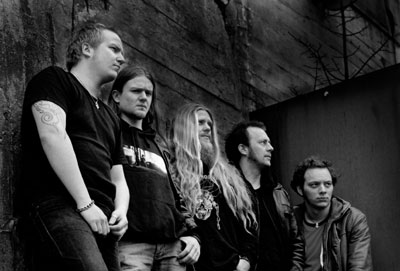
Hi there! How are Kyrre and Vulture Industries doing these days?
Kyrre: Hi, we are doing great, having finally released our debut album. And all those great reviews, it’s overwhelming.
Your band was quasi unknown at least for the Romanian metalfans until you released The Dystopia Journals. Give me a few details about the history of your group.
Kyrre: We will have to forgive them for their ignorance… No, really, since this is our debut, only having released two demos previously, there is no wonder our name has not been much spoken of. Vulture Industries has existed as a name since our fist appearance with the present line-up in March 2004, so wee are still a young band.
There have been dramatic changes in both sound and appearance since the band performed as Dead Rose Garden. From being in the gothic metal landscape, the band picked up some new members, new influences, and ideas. Since DRG the band has progressed into something more, should I say: “progressive”? At least that’s our aim; we will try out any new and interesting ideas, and hopefully evolve and expand musically both as a band and as musicians.
Vulture Industries is not a usual name, why did you choose it? Is there a hidden significance behind this strange name?
Kyrre: The thing is, as I mentioned earlier, we had to have a name for the new constellation. Vulture Industries sounded cool and might also have a more profound meaning if you like. As you listen to the lyrics you will find that VI can be projected upon society as a whole, but then again, it was never intended to be an anti-society-political-thing. There’s more to it than that. I think Bjørnar’s lyrics are great; he has an amazing perspective of very extraordinary states of mind and the dark sides of life and society.
Before we talk about The Dystopia Journals, let me first congratulate you for this album. It was really a pleasant surprise, a very good album. I like it very much and I think it is one of the most original releases of 2007.
Kyrre: Well, thank you, it is greatly appreciated! I read the review (in Romanian) and was very excited by the rating. Of course I didn’t understand much of the rest, but caught some of it.
Did you expect such an excellent feedback from media before you released the album?
Kyrre: To be honest: No, but then again: We had a good feeling when the recordings were mastered, after nurturing the songs for approximately 3 years. It was actually kind of a relief to finally release it on a label, and the first feedback was good, but I don’t think any of us anticipated this massive positive feedback.
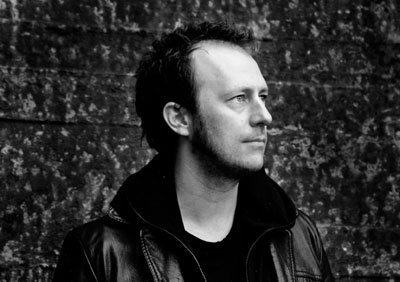
You play an intriguing combination of black metal and progressive with many avant-garde elements, a genre very hard to classify. How could we label your music? What style does Vulture Industries play?
Kyrre: As I said before, and as you point out: The progressiveness is very much intended to be so. The rest is described several times like you do, black and avant-garde. I would definitely place VI under some sort of metal, but I don’t know if either black, extreme, doom, industrial or other terms fit by themselves. So, some sort of progressive metal will fit nicely I think. We enjoy mixing different influences to produce the appropriate mood for each song. The eight tracks of the album are quite different from each other, but at the same time you can find similar elements and sounds. I find it hard to describe the music as being just one style.
What other bands (if any) can you point out in terms of influence and inspiration for Vulture Industries and The Dystopia Journals in particular?
Kyrre: The musical influence of the members of VI is quite diverse I would say, and I don’t think there is any one band that has inspired VI exclusively. The five of us listen to very different music, and I think that’s a significant factor for the VI sound. I could make a list, but it will count 50 bands at least – all these range from old school heavy metal and prog-rock through 80’s rock and heavy metal and up till today’s music.
Your sound reminds me a lot of Arcturus music and especially Bjørnar's vocal approach resembles with Garm’s style of singing. Is this just a pure coincidence?
Kyrre: Yes, definitely. We can all hear the resemblance and appreciate being put in the same league as Arcturus. I asked Bjørnar about this a few days ago, and he at least claims that he hasn’t listened much to Garm, and that he always sung like this - that’s how he sings. Not many sing like Bjørnar and Garm, but it doesn’t make them similar as vocalists. Have a listen to Devil Doll, and you will see my point. I think that’s a bigger influence to Bjørnar than any other. When it comes to Arcturus’ music, our earlier stuff may, unintentionally, have been similar, but I don’t think we sound much like them musically now.
Imagine for a second that you are a journalist and you have to describe your album to a person that hasn’t listened to it until now. What would you tell to that person in order to convince him/her to listen to The Dystopia Journals?
Kyrre: That’s a difficult task, but I will try: The Dystopia Journals is a diverse album of intricate details, playful compositions, epic old time guitar solos, massive riffing and theatrical vocals. Along with mind-digging lyrics this is a complex and much enjoyable record.
The lyrical concept of The Dystopia Journals seems rather eclectic and not so easy to understand. Could you tell me more on this subject? Who is writing the lyrics and what themes are they mostly refer to?
Bjørnar writes the lyrics, and I think he is much inspired by old-time poets like E.A. Poe and others. The Journals refers to an imaginary person’s wicked view upon existential problems, his criticism of stereotypes and society.
Together with Arve and Herbrand, from Enslaved, Bjørnar owns a studio so I guess you had all the time you need to produce your album. You managed to get a beautiful crafted sound, so is it important for a band to have its own studio?
Kyrre: The last two years, Bjørnar has been busy; he has spent huge amounts of time in the studio producing other bands. It took approximately 9 months to record and mix TDJ. The work was done in bulks of 2-3 songs at a time, in between recordings with other bands. And we [VI] were really short of time when we approached deadline for the mix. But apart from that we have used at least twice the time we anticipated before the recording commenced. In part, this was due to the band members’ busy lives, but also because we chose to spend much time on details. As this is Bjørnar’s living we paid for the studio time, but I guess not all hours were accounted for. Not all bands without a record deal could have spent as much time recording and mixing, but it paid off on the production - when we heard the master tape we were all amazed by the massive and transparent sound. Is it important for a band to have its own studio? Of course. Every band can have a studio these days. You don’t need much to do your own recordings. You can use it as a sketchbook, a rehearsal device and you can make pre-recordings. This way, studio-time becomes more efficient and details can be trimmed before final recordings.
How does Vulture Industries live look like? Do you prepare something special for your show, maybe a special outfit, or a specific set of lights, etc?
Kyrre: By now, we have played several concerts in Norway, and our show is catching its shape. Right now we appear on stage in shabby vintage suits, perhaps a tie, nothing fancy. We try to be dynamic on stage, and a visual show to be displayed on screen is in progress. For the time being we have no specific light setting, but we are working on that as well.
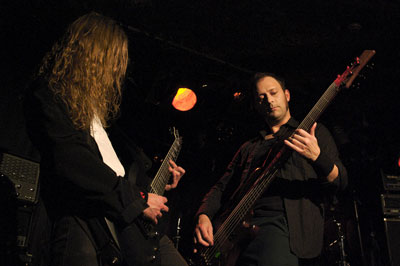
Concerts and tours are an important element of every metal band. What are from this point of view Vulture Industries plans for this year? Do you feel more comfortable on the stage or in the studio?
Kyrre: Right now we have finished a small series of concerts and look forward to rehearsing new songs for a new recording next year. As for touring, we are in progress of planning a European tour early 2008 along with two or three other bands. We are more a live band than a studio band. Making a record is a lot of fun, but it’s also hard work. Finishing a recording is more a release than the recording itself. Live concerts are enjoyable every time. That’s where we get our kicks, playing our stuff to a live audience, the excitement before a show and the direct feedback.
I was talking with Andy Winter from Winds the other day and I’ve asked for his opinion on the Norway metal scene. Because it seems that lately more and more old black metal bands are trying to break the format and expand their musical boundaries towards classical and progressive territories. Is this a sign of evolution or some kind of fashion? What do you think?
Kyrre: I think that’s part evolution and part people being a bit tired of the boundaries of genres. On the other hand we see more and more comebacks of old band and genres. In that way bands are expanding towards both classical styles and approaches and at the same time exploring new expressions. I don’t think it’s a fashion, to quote Neil Peart: “…the more the things change, the more they stay the same…”. I think that sums it up.
What are some of your current favorite bands? What albums impressed you lately?
Kyrre: I could not speak on the other’s behalf, but The Mars Volta and Mastodon have definitely had most turns on my cd-player the last few years. In addition to that Rush is a great influence and all-time-favourite-band, as is Tool, though I think the last album is a bit pretentious and dull. The Melvins’ last album is also great and I think Machine Head made an incredible comeback last year. Of Norwegian bands I have to mention Keep of Kalessin and 120 days, but the band that last gave me a great experience was the Norwegian prog-jazz band Shining.
Do you consider that religious or anti-religious beliefs are important in the creative process? Are you a religious person, or maybe an atheist?
Kyrre: No, I don’t. I think good or evil essentially is a matter of evil, and as far as I concern nobody is interested in evil, believing in it or not. As Bjørnar puts it in Blood don’t flow streamlined … we are all bastard sons of Gods and Devils ... I consider myself a deist I think.
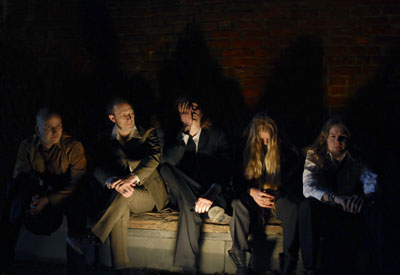
All the Vulture Industries members have a rich musical background, being involved in other bands. From where comes the need to be a part of so many bands and projects? Do you think you could not express your creativity only in one band?
Kyrre: For Øyvind and Bjørnar’s part, they are extremely productive: Sulphur is Øyvind’s baby, and Black Hole Generator is Bjørnar’s. In addition to this, Bjørnar has several old projects that are just for fun and recreation. To make things short I think VI is the main band, but there will always be room for other bands. We have a need for expressing ourselves in different ways.
Will Vulture Industries become a top priority for you or it will be just another musical project?
Kyrre: VI is top priority at the moment, but other bands will also be important.
We live in a time in which the entire world is just a click away. Can you imagine life without internet?
Kyrre: I think that train has gone… fortunately.
How do you perceive music: like a form of art, a way to give people a message, or a way to raise your income, or maybe something in between?
Kyrre: I would say neither. Music comes from an influence or acute idea you choose to express, either to yourself or to amuse others, or rather a combination, a symbiosis: The artist is nothing without its audience, no matter small or large.
As we approach the end of this interview it’s time to ask you the classical questions about your future plans. How long we will have to wait for another Vulture Industries album?
Kyrre: I don’t know exactly, but first we would like to release The Dystopia Journals on vinyl, perhaps with some bonus tracks. We will not start recording a new album for another 6 months I think, but by late 2008 I guess you could expect a new album.
That would be enough. Best luck in whatever you intend to achieve and hope to see you someday playing live in Romania too. Thank you for this interview.
Kyrre: Thank you very much; we can’t wait to meet our Romanian audience!









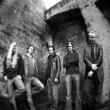
 Posteaza pe pagina mea de Twitter
Posteaza pe pagina mea de Twitter Posteaza pe pagina mea de Facebook
Posteaza pe pagina mea de Facebook Posteaza pe pagina mea de MySpace
Posteaza pe pagina mea de MySpace Trimite pe YM
Trimite pe YM Trimite pe email
Trimite pe email



un album superb
pana n am citit acest interviu am refuzat sa cred ca nu este vorba de arcturus desi am citit pe internet ca este vorba de cu totul o alta comnponentza. in orice caz, asemanarea cu arcturus, atat dpdv al vocii, al instrumentalului si al atmosferei este uimitoare.